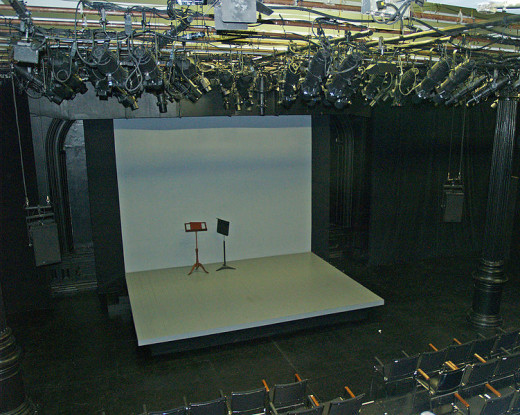How to Perform a Monologue Without Getting Stage Fright
You know the feeling. The fluttering in your stomach. The adrenaline-fueled shakes. The fear of forgetting every line right up there where everyone can see.
Stage fright can be a pretty intimidating thing.
The fear of public speaking is a big one, and it affects a lot of people to at least some degree. When you're performing a monologue for an audience, a little bit of nerves can be a good thing--but a lot can be paralyzing. Here are a few tips to help you control your stage fright and put on a strong performance.
Be Prepared
Whether you're performing a monologue for an audition, a class, or an audience, the first thing you must do is be prepared. Memorize and practice your monologue, first alone, and later in front of a small audience if you can.
Ask for critiques from your friends or maybe a teacher. If you get feedback before your performance time, you'll know what you need to practice and how you need to improve. You should always be open to constructive criticism. That doesn't mean you have to make every change someone else suggests, but if you're unwilling to hear or consider any criticism, you'll never grow as an actor.
The better prepared you are, the more confidence you can have in your performance. There are any number of reasons to feel nervous, but don't let your own under-preparation be one of them.

Drink Water
Stay hydrated. Stick with water for the day of your performance; you'll generally want to avoid too much caffeine and carbonated beverages. Eating and drinking healthy will help you feel physically better, and the better you feel physically, the stronger you can feel mentally and emotionally.
Take Deep Breaths
It seems like such a little thing, but it can really help. Take a moment to center yourself before your performance. Take deep breaths and get the oxygen going through your system. Perform a couple of breathing exercises; they'll help clear both your head and your speaking voice.
Warm Up
Doing a few warm up or improvisation exercises before performing can help you expend and focus some of that nervous energy without taking the energy out of the performance itself. Warm up your voice as well as your body, and in doing so you can work out some of those pre-show jitters.

Use Your Nerves
Remember this: nerves are not a bad thing. A little bit of nervous energy can give your performance a spark, and that's important. Instead of letting those nerves get the best of you, use the energy they give you to get something positive out of it.
Nerves are just a sign that you care about something--if you weren't invested in it, you wouldn't be worried about it.
Control Your Movements
Many monologues can be performed standing perfectly still. If yours is one, make sure to avoid "happy feet." Keep your feet planted firmly in place; don't step around or shuffle your feet at all. It makes you look nervous, and it's better if you can keep those nerves to yourself.
If your monologue does require or encourage movement, have it planned out in advance and practice it. The movement will give you one more thing to focus on and keep yourself occupied so the nerves don't get the better of you.
Consider Your Audience
Some say that if you get nervous, you should imagine your audience is only wearing their underwear. If they look ridiculous, it can alleviate your fears that you'll look ridiculous. I can't say this technique has ever worked for me, but maybe it has for some.
Instead, try picturing your audience as being only your closest friends and family--that is to say, people you're very comfortable with. Each of them wants you to succeed and will love and support you no matter what happens.
What If Something Goes Wrong?
Say something unexpected happens. You slip up on a line, or someone drops something in the audience and the clatter distracts you from your performance. What do you do?
You just move on. Recover, refocus, and move on. Don't get caught up in little mistakes (or even big ones), because a prolonged reaction will only bring more attention to the mistake. Don't let this kind of thing throw off your game. Mistakes happen; it's how you react to those mistakes that shows what kind of a performer you are.
Break A Leg!
Remember, stage fright isn't inherently a bad thing. It gives you energy and helps you focus for a performance, and as often as not, it'll clear up as soon as you say your first words. As long as you go in prepared and ready, you've got solid ground to stand on. Remember these tips, and break a leg!








